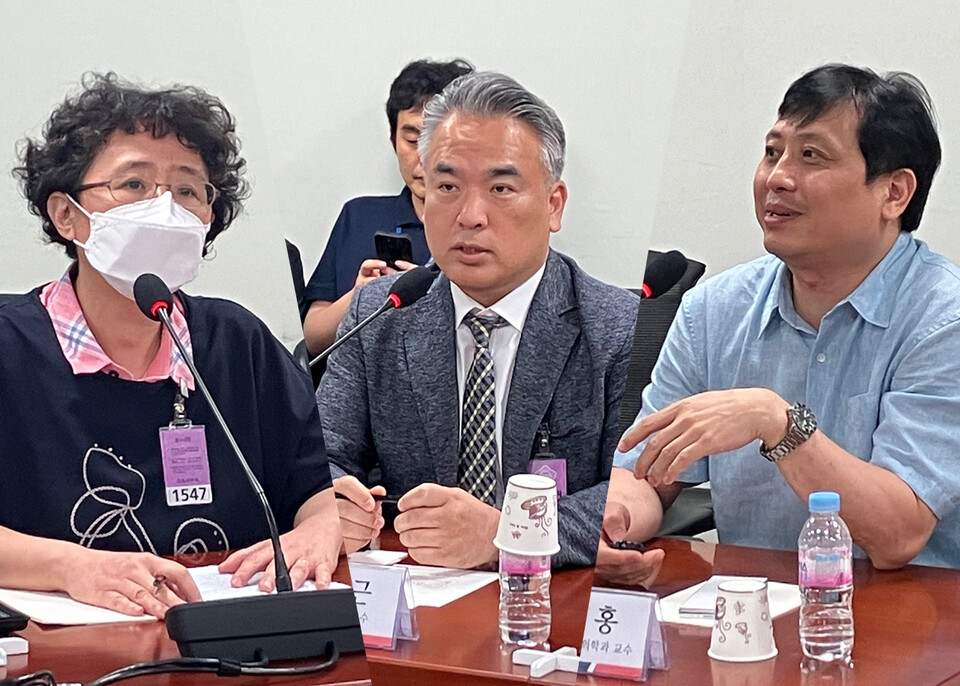
One of the biggest complaints of the medical community is the medical insurance fees that it says “falls short of compensating costs.” Physicians say fees are set below costs so that the more they perform treatments and surgeries with insurance coverage, the larger their deficits grow.
Such a reality resurfaced again in a recent policy discussion.
At the first expert meeting discussing “What is the problem with- medical fees?” organized by Rep. Han Ji-a of the ruling People Power Party at the National Assembly last Friday, doctors pointed out in unison the problem of low fees below the cost.
One of the speakers, Dr. Kim Hyun-ji who works as an academic director of the Korean Medical Association (KMA) has been practicing respiratory medicine for 13 years. Throughout those years, Kim said she has provided treatments only with insurance coverage, never conducting general medical examinations or injected non-reimbursable fluids, disclosing the reality endured by hospitals that hang on "strictly with health insurance payment."
"There are many patients with infectious diseases. To see them, we need protective equipment. We use a different thermometer tip for each patient. We also ensure the use of disinfectant wipes and individually wrapped tongue checkers. However, these costs are not built into treatment fees," Kim said.
Kim continued, "During Covid-19, the government set an infection control fee so neighborhood clinics could treat Covid-19 patients, but that fee has disappeared. They must now see infectious disease patients receiving only 12,000 won ($8.8) set for a second visit.”
What kind of doctor would spend their money like that and still see patients with infectious diseases? Kim asked, attending the discussion wearing a mask because she has been treating an increasing number of Covid-19 patients.
"If I buy a reimbursed osteoporosis injection for 100,000 won and charge it, I get 100,000 won, but there is no cost for alcohol swabs or doctor's fees in that cost. I have to pay more taxes at the end of the year because of the unnecessary increase in sales," she said. "It is an unrealistic situation that I have to pay my money for reimbursed injections."
Dr. Kim said it is necessary to reestablish the “cost of medical care.”
"Regardless of how much physicians receive in annual medical fee negotiations, medical fees for doctors who practice while adhering to principles at primary medical institutions should be renegotiated from the ground up, including that for medical costs," she said. "Otherwise, duplicate examinations will continue, and they will have no choice but to hire nursing assistants (with relatively low labor costs) instead of nurses."
Top general hospitals are not free from what they say as abnormal situations. There are many "non-calculable items" that are necessary for surgery and are not reimbursed for their use. For example, surgical cloths used to cover surgical patients or surgical gloves are items that are not properly compensated.
"There are too many things that are not reimbursed, which should be considered," said Professor Kim Sung-geun of the Department of Surgery at the Catholic University of Korea Yeouido St. Mary's Hospital. “They say it's included in the surgery fee, but they should at least compensate us for the items we use. I'm not asking for more, but hospitals would have more breathing room if the authorities compensated for the cost."
It is also necessary to calculate additional fees for specialty services, Professor Kim said.
"In Korea, if you have a doctor's license, you can practice any medical procedure. In the case of surgeons, if a general practitioner who graduated from medical school performs an appendectomy and a person with 20 years of experience as a surgical specialist performs an appendectomy, the price is the same," he said. "That’s unfair. There should be protection for experience and career."
Emergency medicine experts suggested that the nighttime surcharge be subdivided and added by time of day. In particular, they suggested introducing a late-night surcharge between 2 a.m. and 6 a.m. and a separate consultation fee, saying, “The midnight surcharge for taxis is not available for hospital ERs.”
"There are quite a few hospitals where one person is on call in the emergency room. Most of them have to work the next day, so they ask to call them in the morning if the surgery is not urgent. Recently, people who say they have to call hospitals across the country at 2 a.m. (for patient transfer) ask to call them after 6-8 a.m.," said Professor Min Jin-hong of the Department of Emergency Medicine at Chungnam National University Sejong Hospital.
Professor Min continued, "Taxis and express buses have surcharges, but emergency rooms don’t have them. They should at least do this so we can transfer patients at night. At secondary hospitals, doctors still work alone at night. Many medical accidents also occur at night. In the middle of the night, (surgeries) are delayed, and the vitals often deteriorate rapidly to operate the next day. We need support to compensate for the late-night hours between 2-6 a.m. and to provide more manpower."
The government said it would improve the compensation for material costs after discussions with the relevant medical societies.
"The current method of compensation for material costs is to compensate treatment materials separately or to include them in the fee, but there are advantages and disadvantages, so I can't say which one is right," said Jung Sung-hoon, director of the Insurance Benefits Division at the Ministry of Health and Welfare.

